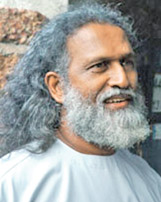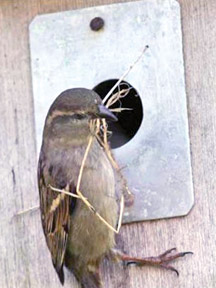Will the decline of House Sparrow affect humans?
By Dhaneshi Yatawara
The house sparrow, the non stop exploiter of anything was once an
extremely common sight.
Until a few years ago, a house didn't become a home without the house
sparrow's nest hanging on the wall made out of a clay pot or a cardboard
box.
|

Prof Sarath Kotagama |
The family only had to fix it and the house sparrow comes from
nowhere and builds the rest of the nest. It was a joyful sight seeing
the house sparrow couple feeding the off springs.
So pleasant to see the offspring grow in to fledgling and fly away to
learn the risks of the world. Basically this little bird breeds and
feeds near people.
Though the house sparrow is quite adaptable to live in a built up
area today one would hardly find these vibrant creatures. Have they
declined greatly in numbers? It is yet to know.
According to several researches done in other countries it is evident
that this is not only happening in Sri Lanka.
Drastic decline
To make the communities aware of the decline in nature's beauties
around us conservationists and nature lovers of the world hold a special
day dedicated to house sparrows and other common birds we see in our day
to day lives sharing our eco system.
March 20 has been named World Sparrow Day which is an initiative by
the 'Nature Forever Society' recognised by the international community.
The Nature Forever Society started by an Indian Ornithologist
Mohammed Dilawar made the world dedicate a day of the year to the house
sparrow and today they still continue to raise awareness about the issue
and distribute nest boxes to encourage the public to bring sparrows into
their homes and neighbourhood. Mohammed Dilawar was featured in 2008 by
the Time magazine as one of the Heroes of the Environment celebrating
his untiring efforts towards environment conservation.
Though countries such as Sri Lanka and India do not know for sure the
declining percentage of house sparrows, in United Kingdom monitoring by
conservationists have shown a drastic decline in the sparrow population.
The data collected by the UK Breeding Bird Survey shows a decrease by
71 percent since 1977 to 2008 with substantial declines in both rural
and urban populations.
The UK Breeding Bird Survey (BBS) is administered by the British
Trust for Ornithology, the Joint Nature Conservation Committee, and the
Royal Society for the Protection of Birds.
The results of the BBS are valuable in evaluating the increasing and
decreasing range of bird population which can be a key point to bird
conservation.
Research
|

House Sparrow (Passer domesticus) |
Why is it important to know the status of the house sparrow and
common birds we see every day?
In a way these birds can indicate us the degrading status of the
environment we live in.
These innocent creatures have to pay for the consequences of the
careless nature of the human beings. We are often engrossed in what
happens to bigger, more glamorous species such as the leopard or the
bear, whereas common species are often ignored.
The sparrows are an important bio-indicator of the health of the
urban environment.
They show us if something has really gone wrong in our habitats.
"Birds are good indicators of environmental changes. For instance, an
increase in the crow population of Colombo would indicate that there has
been poor garbage clearance, and a polluted environment.
An increase in beautiful birds such as the Sunbird would show that we
live in an environment of quality," said expert of the field Prof Sarath
Kotagama of the Department of Zoology of University of Colombo.
The Field Ornithology Group of Sri Lanka, led by Prof. Kotagama will
be launching a preliminary house sparrow count starting from March 20,
Thursday. Research for a ubiquitous, multi-brooded species such as the
house sparrow is difficult unless individuals are marked and their
breeding activities are followed through the breeding season.
"This will be a preliminary study as it is important to know
locations house sparrows are commonly found.
We intend to find where these birds mostly exist," said Malaka
Rodrigo, Coordinator of the Common Bird Survey of the Field Ornithology
Group of Sri Lanka.
The Common Bird Survey can be considered as a 'Citizen Science
project' where general public can also participate.
Citizen science is a term used for projects or ongoing program in
which a network of volunteers, many of whom are not experts in the field
perform or manage research-related tasks such as observation,
measurement or computation.
The use of citizen-science networks often allows scientists to
accomplish research objectives more feasibly than would otherwise be
possible. In addition, these projects aim to promote public engagement
with the research, as well as with science in general.
"The House Sparrow has been living like a part of our lives for
centuries.
We believe that humans have been taken these beautiful birds for
granted living in our immediate environment," he said.
"The numbers of birds in various areas are also dwindling due to
causes such as deforestation, wetland reclamation and changes in
habitat. Even the birds that are common today can be diminished without
our knowledge.
So no species can be labelled as safe, no matter what its number is
today.
It is only when the public becomes aware of the value of these
beautiful creatures, can more be achieved towards protecting them," he
said.
They can make a list of birds that they can identify in a given
location and either email it to [email protected] or post it to FOGSL,
Department of Zoology, University of Colombo, Colombo 3.
The list should include the date, location, weather at the time, the
habitat that the bird was observed in, birds seen and the name and
contact details of the observer. Participants can also enter data
directly to http://www.worldbirds.org/srilanka which is part of the
international network of databases used to analyse status of birds. |

